"Love Is Blind," in which couples agree to marry sight unseen, is a lot to take in. It's an unscripted romance show with an unspoken element of competition, with newly minted couples sizing each other up and wondering who's "good" and who's doomed. It's a melodrama, in which people who barely know each other claim to love one another and agonize over a supposedly lifelong decision.
But the person who best sums up the situation is this season's resident data engineer Sikiru "SK" Alagbada, who calls it the "Hunger Games" of dating.
At least he's fully aware of what it means to volunteer as its tribute. SK ends up (by the reunion episode, anyway) being among the few sensible adults in a season lousy with louche manchildren, achieving that status by resisting the unstated psychological pressure written into the show's code.
The purpose of "Love Is Blind," as frequently restated by hosts Nick and Vanessa Lachey, is to see whether the emotional attraction is a more potent factor in falling in love than a person's looks, race, economic status or lifestyle when it comes to finding The One. The meeting, mating and marriage ritual is compressed into four weeks, leading up to a finale at the altar where they say "I do" or "I don't."
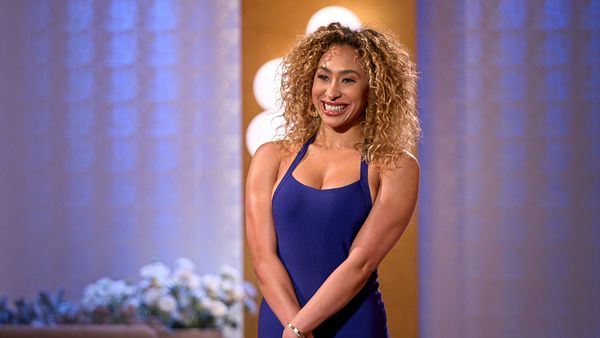 Raven Ross in "Love Is Blind" (Courtesy of Netflix)
Raven Ross in "Love Is Blind" (Courtesy of Netflix)
This so-called "experiment" runs on the participants' frustration with being single, whether legitimate or made up for TV. Figuring out whether the premise worked out with each pair made the first season a delicious watch, especially during the pandemic.
Had COVID-19 never entered the realm of our collective anxiety, "Love Is Blind" still would have been a relatable take on navigating single-and-looking life in the Tinder age and The Bachelor Nation. Without looks to influence one with potential attractiveness, personality becomes everything.
This is how SK seems to come out ahead. He is simply himself, and proposed to Pilates instructor and proclaimed "smoke show" Raven Ross.
"Love Is Blind" is still a Dumpster fire, but the figurative bin might as well be behind a sparkler factory.
When the couples meet in person, Raven becomes a magnet for leering and barely veiled come-ons from other men – each of whom is also engaged.
But Raven calmly rebuffs them, preferring SK's humility and gentleness. The evolution of their relationship develops steadily throughout the season, bringing the couple to a situation that is unexpected but works out for the best by the final episode.
Is this spoiling the latest season? No, because it was already rotten due to the reality genre's version of the observer effect. In physics, this principle holds that the act of observing a system alters the state of that system. In unscripted reality that translates to a loss of whatever sincerity a relatively novel show may have enjoyed due to subsequent participants' familiarity with how it works.
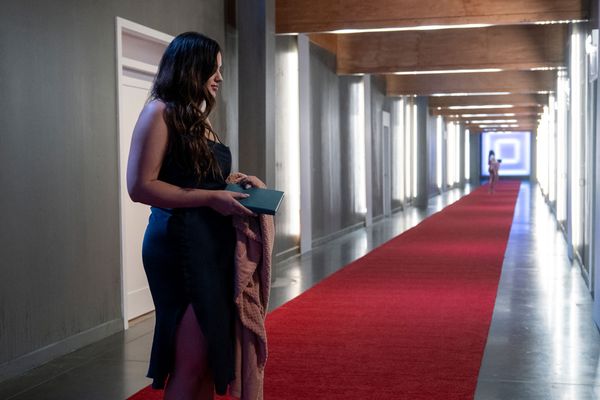 Alexa Alfia in "Love Is Blind" (Courtesy of Netflix)
Alexa Alfia in "Love Is Blind" (Courtesy of Netflix)
Little about "Love Is Blind" qualifies as groundbreaking. The proposition dangles the prospect of heteronormative marriage, pretty much leaving queer people out of the running. (Season 1 included a man who came out as bisexual, leading his fiancé to break things off – not a great message.)
Until this season, in fact, people who didn't fit the conventional image of attractiveness were excised from the picture – specifically plus-sized women. The curvaceous Alexa Alfia is this season's answer to that even though she's only unconventional by Hollywood standards. Indeed, many of this season's tweaks have producers' fingerprints on them, further degrading the illusion of natural spontaneity that made the first season so spectacular. It was still a Dumpster fire, but the figurative bin might as well have been behind a sparkler factory. You never knew what was going to pop off, or when, or how.
Romance reality chemistry is rarely as stupendous as it is in the first seasons when the wonder and the schadenfreude are still fresh and new. Hence the understanding that in the reality realm, the term "experiment" is simply a buzzword that has the same weight as a "journey" or catchphrases about participating in a show for "the right reasons."
Every romance reality show that's come into being since "The Bachelor" became a phenomenon has been more effective in gaining exposure for participants than achieving the stated goal of finding a lifelong partner, although some series are better at producing romantic matches than others.
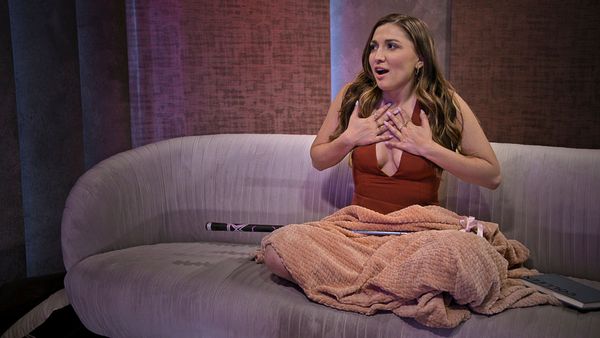 Colleen Reed in "Love Is Blind" (Courtesy of Netflix)
Colleen Reed in "Love Is Blind" (Courtesy of Netflix)
"Love Is Blind" comes from the same production company that gives us "Married at First Sight," a Lifetime (by way of FYI) series that came closest to operating like a true experiment in its first few seasons.
"Married at First Sight" tasks a sociologist, a marriage counselor and a communications and relationship expert to match participants using an array of traits, trusting participants to trust the process and get to know one another, albeit in a captive partnership they can choose to abandon.
Now that show is in its 16th cycle, however, contestants know how the game works, and the producers have a better notion of what keeps the audience talking, and the result is a circus of dramatics earlier seasons avoided, in part, because the participants' quality and the honesty of their mission.
More often, contestant seem to know their purpose is to vie for the lead in this production of Bad Decision Theater.
"Love Is Blind" never claimed to be anything other than an Instagram-fame generator, to its credit. Nevertheless, the chaotic emotional tumult of the first season achieved a dizzying veracity that subsequent seasons have struggled to match.
Any reality season's success or failure is in its casting. With this one, the balance of ecstasy and horror lies within its combination of participants who are truly there to find their forever love and the ones who know they look good and want to see how far that takes them. Sometimes even those types surprise us, as was the case with Colleen, who quickly realizes that whatever allure that being a professional dancer may bring her in the real world doesn't work in the pods.
More often, however, they seem to know their purpose is to vie for the lead in this production of Bad Decision Theater, displaying complete awareness of their value as characters.
The most famous may be one who didn't end up meeting his soulmate: wildlife photographer Andrew Liu, who did his damndest to make the ladies moist by holding forth on his feelings. But when he proposes to Nancy Rodriguez and she rejects him, he squeezes eye drops into his peepers during his adios confessional, perhaps trusting the producers to edit it to make it look as if he was crying. They do not.
No need, since viewers at home may have already been weeping on the inside for Nancy, who chooses Bartise Bowden, a 26-year-old going on 15 creep whose first nights with his betrothed are spent discussing how attractive other women are.
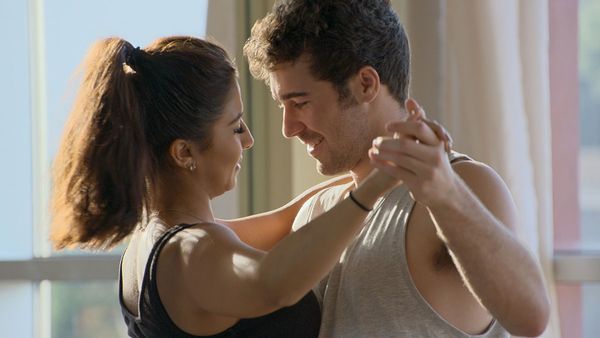 Zanab Jaffrey and Cole Barnett in "Love Is Blind" (Courtesy of Netflix)
Zanab Jaffrey and Cole Barnett in "Love Is Blind" (Courtesy of Netflix)
Somehow Bartise isn't as infuriating as Cole Barnett, who spends his limited time with his fiancée Zanab Jaffrey needling her abandonment issues and refusing to curb his slovenly ways. When she comes over to his house for the first time, there are dirty clothes everywhere and flies in his toilet.
Those can be ameliorated with a bit of elbow grease; the type of judgment that leads him to playfully inquire whether she's bipolar and say, "I love you, I just kind of hate you a little bit too," a mere 48 hours before their wedding requires professional assistance.
Some of these are personality quirks baked in the DNA of these men, and some are put on for the camera. Cole and Bartise are children of the reality age who know the villains tend to be the most memorable. Maybe they actually were taking part in the show to find lasting relationships. Or maybe they viewed it as an opportunity to stand out in a show that promotes the dream of lifelong fidelity while making a strong case that the concept is dead.
Want a daily wrap-up of all the news and commentary Salon has to offer? Subscribe to our morning newsletter, Crash Course.
Either way, in this show the likes of Cole and Bartise become more inevitable as seasons progress, although it is a bit mind-boggling to see this one degenerate into "Jerry Springer Presents FBoy Island" so quickly.
The first season of "Love Is Blind" yielded two couples that have lasted for four years, so that's . . . something. None of the match-ups from the second season remain intact, and who knows whether any of the recent crew will last until the fourth season premieres.
When it does, the show will likely be as popular as it is now – maybe even more, if the durable fandom for "The Bachelor" and "The Bachelorette" tells us anything. Viewers love the idea of love, and love being validated in their opinion that finding true love is as impossible as the dating scene.
Despite this, and the prevalence of the Coles and Bartises in the dating jungle, the complicated story of SK and Raven had seemed hopeful. They're a work in progress when we last see them, refusing to be herded to the producers' conclusion. From the hopeful viewers' point of view, the promise of them making it would have been due to the fact that they went into the pods and exited the experience with eyes wide open. Future participants might have been wise to watch them and learn, except . . .
. . . maybe not. The couple has already called it quits. Just this past Sunday, they issued a statement that they're splitting due to cheating allegations and unexplained "legal proceedings," reports People. That's unfortunate. It looked as if they'd beaten the "Love Is Blind" game, but in the end they may have actually played themselves.
Read more
about dating reality shows


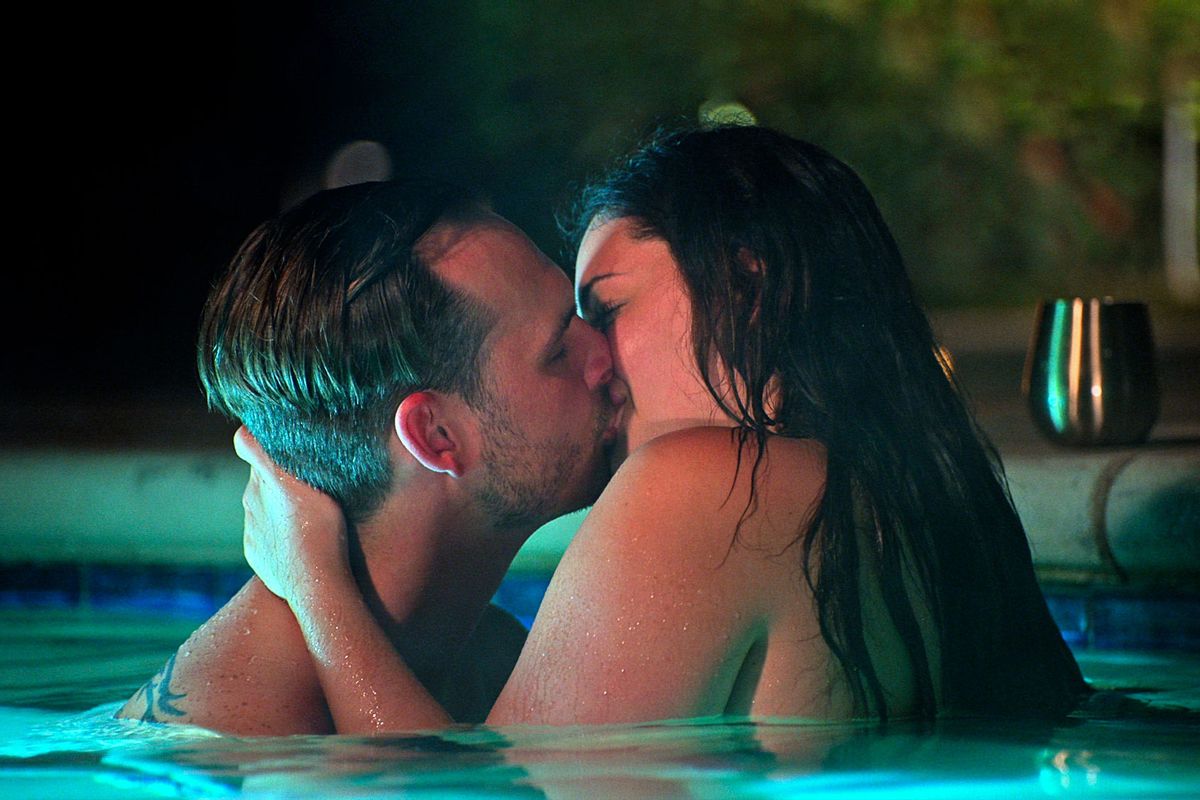
Shares